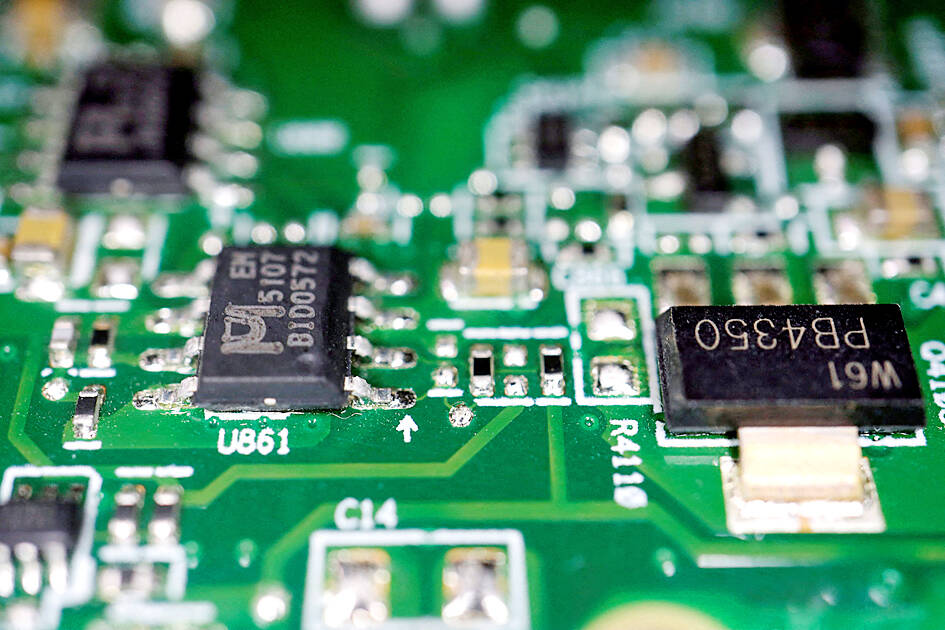The US Department of Commerce yesterday said that it had finalized a US$123 million grant for Polar Semiconductor LLC to expand its plant in Minnesota, which would allow the company to nearly double its US production capacity of power and sensor chips.
The award, part of a US$52.7 billion semiconductor manufacturing and research subsidy program, is the first in the program to be finalized by the Commerce Department.
The department would distribute funds based on Polar’s completion of project milestones.

Photo: Reuters
US Secretary of Commerce Gina Raimondo said that the award would help “create a new US-owned foundry for sensor and power semiconductors” and boost Polar production from roughly 20,000 wafers per month to 40,000 serving aerospace, automotive and defense needs.
The state of Minnesota is contributing US$75 million to the US$525 million expansion at Polar, which is 70 percent owned by Sanken Electric Co and 30 percent held by Allegro MicroSystems Inc.
The department has allocated more than US$35 billion for 26 projects, including US$6.4 billion in grants to Samsung Electric Co to expand chip production in Texas, US$8.5 billion for Intel Corp, US$6.6 billion for Taiwan Semiconductor Manufacturing Co (台積電) to build out its US production and US$6.1 billion for Micron Technology Inc to fund US factories.
The department must complete due diligence before it can finalize awards.
“You’re going to start to see more awards like this, dollars to companies in the coming weeks and months,” Raimondo said.
The 2022 CHIPS and Science Act championed by the administration of US President Joe Biden aims to boost efforts to make the US more competitive with China and dramatically expand US chips production. The law also includes a 25 percent investment tax credit for building chip plants, estimated to be worth US$24 billion.
Separately, the US Congress on Monday gave final approval to legislation that would streamline federal permitting processes for semiconductor manufacturing projects.

South Korea’s equity benchmark yesterday crossed a new milestone just a month after surpassing the once-unthinkable 5,000 mark as surging global memory demand powers the country’s biggest chipmakers. The KOSPI advanced as much as 2.6 percent to a record 6,123, with Samsung Electronics Co and SK Hynix Inc each gaining more than 2 percent. With the benchmark now up 45 percent this year, South Korea’s stock market capitalization has also moved past France’s, following last month’s overtaking of Germany’s. Long overlooked by foreign funds, despite being undervalued, South Korean stocks have now emerged as clear winners in the global market. The so-called “artificial intelligence

NEW IDENTITY: Known for its software, India has expanded into hardware, with its semiconductor industry growing from US$38bn in 2023 to US$45bn to US$50bn India on Saturday inaugurated its first semiconductor assembly and test facility, a milestone in the government’s push to reduce dependence on foreign chipmakers and stake a claim in a sector dominated by China. Indian Prime Minister Narendra Modi opened US firm Micron Technology Inc’s semiconductor assembly, test and packaging unit in his home state of Gujarat, hailing the “dawn of a new era” for India’s technology ambitions. “When young Indians look back in the future, they will see this decade as the turning point in our tech future,” Modi told the event, which was broadcast on his YouTube channel. The plant would convert

‘SEISMIC SHIFT’: The researcher forecast there would be about 1.1 billion mobile shipments this year, down from 1.26 billion the prior year and erasing years of gains The global smartphone market is expected to contract 12.9 percent this year due to the unprecedented memorychip shortage, marking “a crisis like no other,” researcher International Data Corp (IDC) said. The new forecast, a dramatic revision down from earlier estimates, gives the latest accounting of the ongoing memory crunch that is affecting every corner of the electronics industry. The demand for advanced memory to power artificial intelligence (AI) tasks has drained global supply until well into next year and jeopardizes the business model of many smartphone makers. IDC forecast about 1.1 billion mobile shipments this year, down from 1.26 billion the prior

People stand in a Pokemon store in Tokyo on Thursday. One of the world highest-grossing franchises is celebrated its 30th anniversary yesterday.